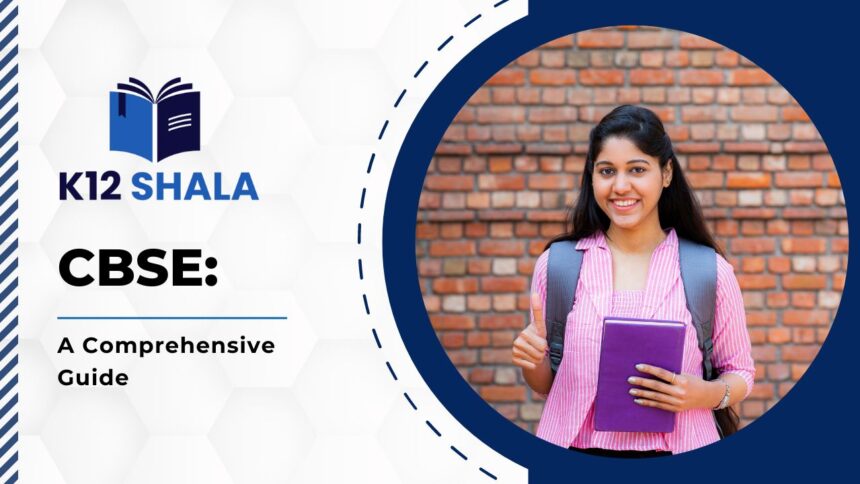Introduction to CBSE
Are you curious to unravel the mysteries behind CBSE, the cornerstone of India’s educational landscape? Join us on a journey through the depths of the CBSE curriculum, exploring its rich history, structure, advantages and challenges. Whether you’re a student navigating this academic realm or a parent seeking insights, this comprehensive guide will illuminate all facets of CBSE education. Let’s dive in!
History of CBSE and its Evolution
The Central Board of Secondary Education (CBSE) has a rich history that dates back to 1929 when it was established as a joint board named the “Board of High School and Intermediate Education, Rajputana.” Over the years, it evolved into its current form as the CBSE in 1952. Initially confined to just a few regions, it gradually expanded its jurisdiction across India.
With changing times and educational needs, the CBSE continuously evolved its curriculum and assessment methods. It introduced innovative teaching techniques, updated syllabi to keep pace with advancements in various fields, and implemented modern evaluation systems to ensure holistic development of students.
Today, the CBSE is one of the most prominent education boards in India known for its comprehensive curriculum that focuses on academic excellence while also promoting co-curricular activities. Its evolution reflects a commitment to adapting to the dynamic educational landscape and catering to diverse student needs.
Structure of CBSE Education System
The structure of the CBSE education system is designed to provide a well-rounded learning experience for students.
CBSE follows a centralized approach, with a uniform curriculum followed by affiliated schools across India and abroad. This ensures consistency in education standards and assessments.
The board offers classes from primary level up to senior secondary, covering a wide range of subjects to cater to diverse interests and career paths.
Assessment in CBSE includes both formative and summative evaluations, focusing on continuous learning and skill development rather than rote memorization.
Additionally, CBSE places emphasis on co-curricular activities such as sports, arts, and community service to promote holistic development among students.
The structured approach of CBSE aims to equip students with knowledge, skills, and values necessary for their academic success and personal growth.
Advantages and Disadvantages of CBSE Board
When it comes to the Central Board of Secondary Education (CBSE) curriculum, there are several advantages and disadvantages that students, parents, and educators should consider.
One of the main advantages of CBSE is its standardized nature. With a common syllabus across all schools affiliated with CBSE students can easily transition between different schools without facing major curriculum changes.
Additionally, CBSE puts a strong emphasis on holistic education by incorporating co-curricular activities along with academics. This helps in overall personality development among students.
On the flip side, one disadvantage of CBSE is the heavy focus on rote learning and memorization for exams. Some critics argue that this approach does not encourage critical thinking skills or creativity.
Moreover, the vast syllabus under CBSE can sometimes lead to stress and pressure among students to cover everything within a limited time frame before exams. However, effective time management techniques can help alleviate this issue.
Comparison with Other Education Boards
When it comes to choosing the right education board for your child, the comparison between CBSE and other boards is inevitable. One of the most significant differences that sets CBSE apart is its focus on a more centralized curriculum across schools in India. This ensures uniformity and standardization in education.
In contrast, boards like ICSE or state boards may offer a more diverse range of subjects with a different approach to teaching methodologies. While CBSE focuses on theoretical knowledge, ICSE emphasizes application-based learning.
Another aspect to consider is the grading system used by different boards. CBSE follows a Cumulative Grade Point Average (CGPA) system, while others may have their unique grading scales.
The decision between CBSE and other boards depends on various factors such as your child’s learning style, future educational aspirations, and personal preferences. It’s essential to research and understand these differences before making an informed choice for your child’s academic journey.
Top CBSE Schools in India
When it comes to the top CBSE schools in India, there are several institutions that stand out for their academic excellence and holistic development approach. These schools not only focus on providing quality education but also emphasize extracurricular activities to nurture well-rounded individuals.
One such school is Delhi Public School (DPS), with its widespread presence across the country and a reputation for producing top-notch students year after year. Another renowned institution is The Shri Ram School, known for its innovative teaching methods and emphasis on critical thinking skills.
Modern School in Delhi is also highly regarded for its strong academic curriculum and supportive learning environment. Meanwhile, DAV Public Schools have made a mark with their focus on values-based education and overall student growth.
These top CBSE schools in India set a high standard of education and play a crucial role in shaping the future leaders of tomorrow.
Tips for Preparing for CBSE Exams
Preparing for CBSE exams can be a daunting task, but with the right strategies, you can ace them effortlessly. Create a study schedule that allows time for revising all subjects thoroughly. Prioritize topics based on their weightage in the exam to allocate more time to challenging areas.
Utilize past exam papers and sample papers to familiarize yourself with the question pattern and marking scheme. Practice solving questions within the stipulated time frame to improve time management during the actual exam. Form study groups or seek help from teachers or tutors to clarify doubts and enhance understanding of complex concepts.
Stay organized by maintaining notes and flashcards for quick revision before exams. Take regular breaks during study sessions to avoid burnout and maintain focus. Stay healthy by getting adequate sleep, eating well-balanced meals, and staying hydrated.
Stay positive and believe in your abilities – confidence plays a significant role in performing well in exams!
Career Options after Completing CBSE Education
After completing CBSE education, students have a wide array of career options to explore. One popular choice is pursuing higher studies in various fields such as engineering, medicine, business administration, or humanities. Many opt for undergraduate courses like B.Tech, MBBS, BBA, or BA depending on their interests and aspirations.
Another avenue is entering the professional world directly by starting a career in sectors like IT, finance, marketing, or government services. Job opportunities are plentiful for CBSE graduates with companies often valuing the strong foundation and academic rigor that CBSE curriculum provides.
Moreover, some students choose to pursue vocational courses in areas like fashion designing, hospitality management, photography etc. These courses offer practical skills training and can lead to exciting careers in specialized industries.
Overall, CBSE education equips students with a well-rounded foundation for a successful future, opening up various opportunities for them to excel in their chosen fields. It is important for students to choose a career path that aligns with their interests and strengths, rather than simply following the crowd. With dedication and hard work, CBSE students can achieve great heights and carve out a fulfilling career for themselves.
Challenges Faced by CBSE Students and Solutions
Navigating the CBSE curriculum can present various challenges for students, from the pressure of academic performance to managing a vast syllabus. Many students struggle with finding a balance between extracurricular activities and studies, leading to stress and burnout. Additionally, the competitive nature of CBSE exams can create anxiety among students striving for top scores.
One common challenge is coping with the workload and time management. Students often find it challenging to stay organized and meet deadlines while juggling multiple subjects. Another issue is understanding complex concepts in subjects like Math or Science, which may require additional help or resources outside of school hours.
To address these challenges, developing effective study habits such as creating a study schedule, seeking clarification on difficult topics from teachers or tutors, and practicing regular self-care are essential. Joining study groups or online forums for peer support can also be beneficial in sharing knowledge and strategies for exam preparation.
Moreover, maintaining a healthy work-life balance by engaging in hobbies or physical activities can alleviate stress and improve overall well-being during challenging times throughout the academic year. By recognizing these challenges proactively and implementing practical solutions, CBSE students can enhance their learning experience and achieve success in their educational journey.
Future of CBSE: Emerging Trends and Changes
As we look towards the future of the CBSE curriculum, it’s clear that change is on the horizon. Emerging trends indicate a shift towards more interactive and technology-driven learning experiences. With advancements in artificial intelligence and virtual reality, students can expect a more personalized approach to education.
Incorporating skills like critical thinking, creativity, and problem-solving will be crucial in shaping the next generation of learners. The focus is moving away from rote memorization towards holistic development and practical application of knowledge.
Changes in assessment methods are also anticipated, with an emphasis on continuous evaluation rather than just exam-based grading systems. This shift aims to reduce student stress levels and promote a deeper understanding of concepts.
The future of CBSE promises an exciting transformation in how students learn and grow academically. By embracing these emerging trends and changes, educators can prepare students for success in an ever-evolving world.
Conclusion
The CBSE curriculum has been a cornerstone of the Indian education system for decades, offering a comprehensive and structured approach to learning. From its humble beginnings to its current form, CBSE has evolved to meet the changing needs of students and educators alike.
While there are both advantages and disadvantages to opting for a CBSE education, it remains one of the most popular choices among students in India. With top schools across the country following this curriculum, students have access to quality education that prepares them for future endeavors.
As we look towards the future of CBSE, we can expect to see continued changes and innovations that align with global educational standards. By staying updated on emerging trends and challenges faced by students, CBSE aims to provide a dynamic learning environment that equips learners with skills for success in an ever-evolving world.
Choosing the CBSE curriculum sets a strong foundation for academic excellence and personal growth. With dedication, hard work, and support from teachers and parents, students can navigate through challenges and excel in their academic journey with CBSE.










